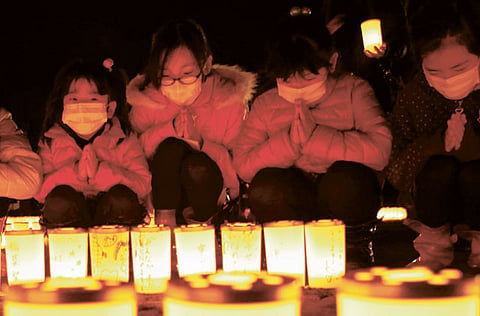Japan prepares to mark the day tsunami struck
One year on, reports reveal ministers knew of meltdown threat

Tokyo: Japan was, on Saturday, preparing to mark the first anniversary of its tsunami, as government papers revealed ministers were warned of the possibility of meltdowns at Fukushima just after the waves struck.
A summary of a government meeting held about four hours after a giant earthquake sent a wall of water crashing into the atomic power station showed that one unidentified participant had cautioned of the risk of a meltdown.
“If the temperature of the reactor cores rises after eight hours, there is a possibility that a meltdown will occur,” the person said, according to the summary released on Friday.
Fukushima Daiichi, 220 kilometres north-east of Tokyo, spewed radiation after its cooling systems were knocked out by the tsunami when it crushed coastal communities and left more than 19,000 people dead or missing.
The government and plant operator Tokyo Electric Power maintained for months there had been no meltdown at Fukushima, despite repeated warnings from independent experts.
They finally admitted in May that three of six reactors had suffered meltdowns.
Marking the moment
Tens of thousands of people were made homeless by the nuclear crisis and some tracts of land inside a 20-kilometre exclusion zone are expected to be uninhabitable for decades because of radiation levels.
Much of public life will pause on Sunday at 2:46pm (9:46am UAE) to mark the exact moment a 9.0 magnitude earthquake struck off the country’s east coast on March 11 last year.
Public transport is expected to stop, and Tokyo’s busy shopping districts will fall silent for a minute as the country honours the memory of those who died when the towering tsunami smashed ashore.
A formal ceremony in the capital will be the centrepiece of Japan’s official remembrance, with speeches from Prime Minister Yoshihiko Noda and Emperor Akihito.
The 78-year-old emperor, who underwent heart surgery three weeks ago, will attend 20 minutes of the hour-long ceremony with Empress Michiko, the royal household said on Saturday.
Meanwhile, health uncertainties torment Japanese in the nuclear zone. Yoshiko Ota keeps her windows shut. She never hangs her laundry outdoors. Fearful of birth defects, she warns her daughters: Never have children.
This is life with radiation, nearly one year after a tsunami-hit nuclear power plant began spewing it into Ota’s neighbourhood, 60 kilometres away. She’s so worried that she has broken out in hives.
“The government spokesman keeps saying there are no immediate health effects,” the 48-year-old nursery school worker says. “He’s not talking about 10 years or 20 years later. He must think the people of Fukushima are fools. “It’s not really OK to live here,” she says. “But we live here.”
“People are scared to death,” says Wolfgang Weiss, chairman of the UN Scientific Committee on the Effects of Atomic Radiation, which is studying Fukushima. “They are thinking, ‘Tell me. Is it good or bad?’ We can’t tell them. Life is risky.”
Sign up for the Daily Briefing
Get the latest news and updates straight to your inbox
![Facility temporarily closed as authorities probe safety lapses. [Illustrative image]](http://media.assettype.com/gulfnews%2F2025-12-19%2Fgzzcwfvh%2FSauna.jpg?w=320&auto=format%2Ccompress&fit=max)


